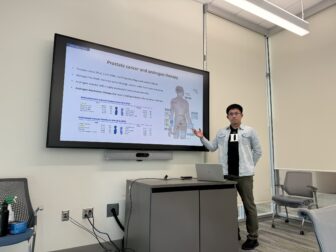Min-Yu Ko

Exploring a New Drug Target for Treatment-Resistant Prostate Cancer
Summary
Prostate cancer is one of the most frequently diagnosed cancers and is second only to lung cancer for cancer deaths in men in the United States. In patients with prostate cancer, male hormones, called androgens, acting through the androgen receptor, help tumors grow and spread. Thus, reducing androgen levels through hormone therapy has become the primary therapeutic strategy for prostate cancer. While hormone therapy works well in most patients as an initial intervention, the majority of patients will relapse, and their tumors will emerge as castration-resistant prostate cancer, where tumor growth continues despite exceptionally low levels of androgens. The role of androgen receptors when there are low/castrate levels of androgens remains largely unknown. Surprisingly, we discovered that low levels of androgens, such as those produced within tumors, facilitate activation of the mammalian target of rapamycin (mTOR) protein, resulting in increased tumor growth. These findings identify mTOR signaling as a direct target of the androgen receptor and establish the importance of this interaction in regulating prostate cancer cell growth. We are focused on developing drugs that exploit the axis of androgen receptor-mTOR as a therapeutic approach for prostate cancer.
Watch a Q&A with Min-Yu
I am sincerely grateful to be awarded the predoctoral fellowship by the PhRMA Foundation. This honor is a significant milestone in my academic career and provides an opportunity for me to delve into tumorigenesis mechanisms in castration-resistant prostate cancer and develop novel therapeutic strategies. I look forward to the journey ahead and am committed to contributing valuable research to the field.

